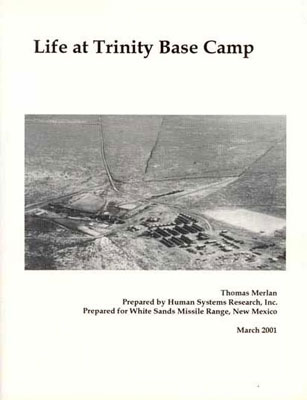


Life at Trinity Base Camp
by Thomas Merlan ©2001 142 pages $15.00
A very remote and isolated location in central New Mexico was selected for the Trinity Test site. The soldiers assigned to the Trinity Test site did not know their final destination when they received their travelorders to New Mexico. With a few rare exceptions, the soldiers and other personnel who set up the experiment did not know the purpose of their work until the actual explosion took place. To maintain this high level of secrecy, a base camp, the headquarters of the McDonald Brothers Ranch, was established a few miles southwest of Ground Zero. While the soldiers and scientists developed the necessary infrastructure for the test, Trinity Base Camp was their home. Because of the high level of security, the soldiers never left Base Camp during the seven months prior to the Trinity event. Baseball, poker, and playing polo on horses from the military police detachment helped alleviate the boredom.
Life at Trinity Base Camp provides a vivid description of everyday life at this camp through photographs and interviews with individuals like the camp clerk, a military policeman, and the young private responsible for the garbage detail. Unlike the abundant scientific reports available for Trinity Experiments, the written record is nonexistent for learning about the day-to-day activities at Trinity Base Camp.
Mr. Merlan relied heavily on interviews with several individuals, often using the words of these men to describe the details about the camp and daily life. Historic photographs of the Trinity Base Camp, the soldiers, and other participants contribute to the description of camp life. In addition, the archaeological and architectural remains of Trinity Base Camp were documented and verified during the interviews and site visits.
Return to Publications




